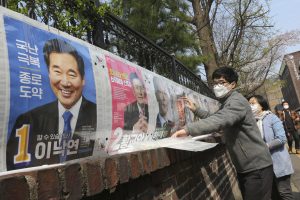This week, South Korean politicians officially started campaigning for the April 15 election, in which all 300 seats in the National Assembly are up for grabs. With only 14 days of campaigning allowed by law, the ruling Democratic Party is hoping to capitalize on the political momentum from the government’s largely successful coronavirus response to retain a plurality of seats in the legislature.
One of the major issues for the election is, of course, logistical. While South Korea has been widely praised for keeping the COVID-19 outbreak under control through rigorous testing and monitoring, there are concerns about how to handle large groups of people heading to the polls on the 15th. In an effort to keep voters safe, the National Election Commission (NEC) is requiring voters to wear masks, and they will be checking temperatures upon arrival. They will also be providing sanitizer and gloves onsite for extra protection.
For the 4,000 or so voters who are unable to go out and vote because they are under quarantine for COVID, the NEC is making special allowances to vote by mail or early absentee.
However only half of overseas Koreans will be able to cast their ballots — the National Election Commission has closed polling stations in 40 countries around the world including the United States, Italy, and Germany because of local COVID-19 conditions. Because they do not accept overseas ballots by mail, this leaves 46.8 percent of the 172,000 eligible overseas voters unable to participate in the election.
The Democratic Party is going into the election with good momentum. The election is largely seen as a referendum on President Moon Jae-in, who is just over halfway through his single five-year term in the Blue House. While Moon hasn’t seen widespread success on domestic policy and has fallen into several foreign policy quagmires, including most recently with Japan, his approval rating has remained steady. In recent weeks, that approval has jumped up, hitting a 16-month high of 52.5 percent for the last week of March as the president drew more approval for his handling of the outbreak (although there is evidence this approval is breaking down largely along partisan lines).
The ruling party also benefits from an opposition that has struggled to find its footing in the four years since the impeachment of former president Park Geun-hye. The main conservative party recently changed their name yet again after merging with several minor parties, becoming the United Future Party. This was the conservative faction’s second name change since 2017, and third in less than a decade.
One recent blow to the opposition was an election reform law that the ruling party pushed through at the end of last year that will go into effect for the first time for the April 15 election. As part of this reform, the voting age was reduced from 19 to 18, although there are concerns that coronavirus-related school closings may make it difficult to educate these newly enfranchised voters and encourage them to show up at the polls.
In addition, the law shifted how the legislature’s proportional seats are distributed. The National Assembly is made up of 253 directly elected seats and 47 proportional seats where voters choose their preferred party. Under the new law that ratio won’t change, but the way proportional votes are tallied has now shifted in a bid to boost chances for minor parties to snag a seat in the Assembly.
Because of this new reform, new parties have been springing up left and right. The number of parties officially on the ballot is 35 — a new record. In fact, because of these new contenders the proportional representation ballot is now too long for South Korea’s automatic counters, so the ballots will have to be counted by hand for the first time since 2002.
Many of these small parties are targeting more specific issues, hoping to gain attention if not a seat at the table. Of particular interest among these new parties are the North-South Unification Party, started by North Korean defectors now living in the South, as well as the Women’s Party, which is running on a feminist platform.
Controversially, this number also includes several spin-off parties affiliated with the ruling and main opposition. By splitting off, those groups can take advantage of the new rules favoring minor parties, and then simply ally or even merge with the main parties once they get into the legislature.
With COVID-19 looming large both in terms of logistics and politics, the results of the upcoming election should prove to be a barometer not only of how well a country can pull off an election in the midst of a pandemic — something other countries will certainly need to take note of in the coming months — but also how the South Korean public feels about their government’s response.

































